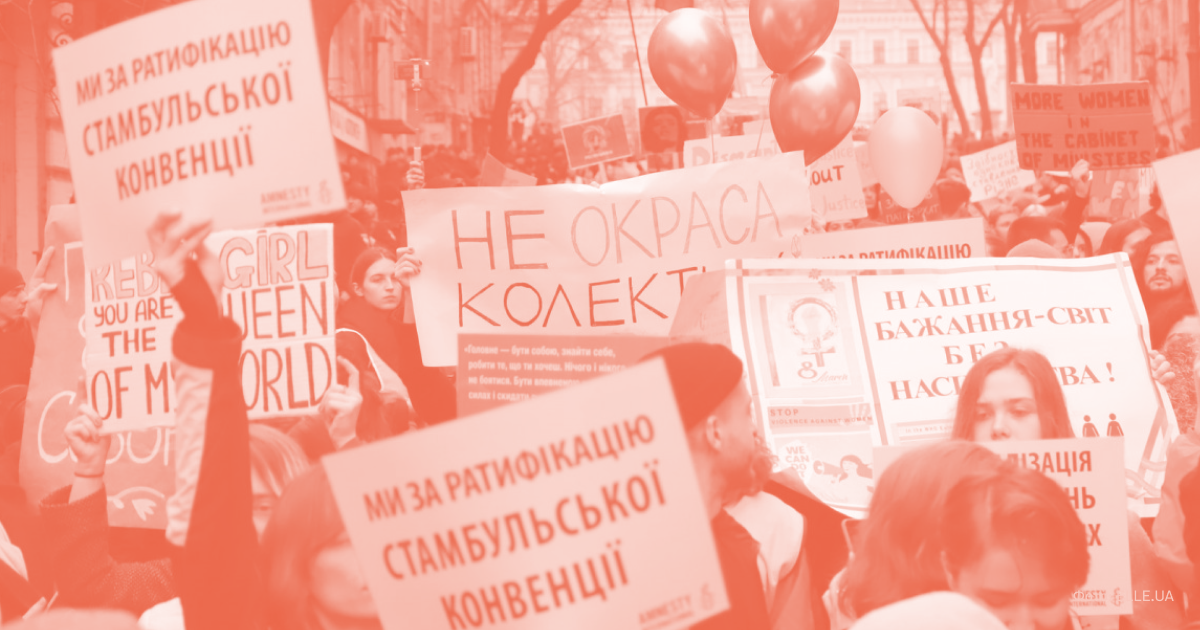2 years of the Istanbul Convention: How Ukraine's Legal System is Changing

In 2011, the Council of Europe adopted the Convention on preventing and combating violence against women and domestic violence. Ukraine was one of the drafters of the Istanbul Convention. On November 7, 2011, Ukraine signed the Convention but did not ratify it.
The first attempts to support the document in parliament were made in 2016 and 2019. However, it was not until June 20, 2022, that the Verkhovna Rada of Ukraine ratified the Istanbul Convention. 259 MPs voted in favour and 8 against. On November 1, 2022, the Convention entered into force.
Svidomi explains how Ukrainian legislation has changed in two years thanks to the Istanbul Convention and what changes the legal policy requires.
What and how does the Istanbul Convention aim to regulate?
The Istanbul Convention is an international agreement of the Council of Europe aimed at preventing domestic violence, protecting victims and punishing perpetrators. It strengthens the obligations of the state and provides tools to protect the population from all forms of violence, including physical, psychological, sexual, etc.
The value of the Convention lies in the fact that, for the first time, an international document binding on the countries that have ratified it addresses not only discrimination against women but also domestic and other various forms of violence against women: sexual violence, including rape, forced marriage, forced abortion, forced sterilisation, female genital mutilation, sexual harassment, etc.

"The ratification of the Istanbul Convention shows that Ukraine supports its European integration course. It proves that we understand our problems, we are ready to respond to them, to apply new practices or to take responsibility for their non-implementation,"
says Kateryna Shunevych, head of the Analytical Center JurFem.
All types of violence defined in the Convention are not regarded as private issues of the victim or internal family problems but as crimes and human rights violations, the responsibility for responding to which lies with the state.
Before its ratification in Ukraine, the Istanbul Convention on the Prevention of Violence against Women and Domestic Violence was surrounded by myths and was perceived with prejudice.
In particular, in 2016, an attempt to ratify the document failed due to its definitions of ‘gender’ and ‘sexual orientation’. At that time, MPs decided that reservations to the Convention should first be prepared to align with 'Ukrainian moral values'.
The Council of Churches of Ukraine has also repeatedly opposed the ratification of the Istanbul Convention. It explained that the document allegedly imposes a gender ideology that replaces the ‘usual concept of biological sex’. The church believed that this was a direct way to promote same-sex relationships.
"Now, at least in my circle, there is less speculation about the Istanbul Convention. Recently, I have not heard any speculations about same-sex marriage or an attack on family values," the analyst notes.

However, Kateryna Shunevych adds that Ukraine ratified the Istanbul Convention with two reservations. Firstly, the document does not apply to the regulation of family relations: "Ukraine does not consider any of the provisions of the Convention as obliging it to amend the Constitution of Ukraine and the Family Code of Ukraine, nor does it interfere with the right of parents to bring up their children according to their own beliefs."
Furthermore, according to the Istanbul Convention, the state must compensate victims for material damage and then seek mechanisms for recovery from the perpetrator. However, Ukraine does not intend to do that yet.
How has legislation changed in the two years since the Istanbul Convention came into force?
After the ratification of the Istanbul Convention, the vector of legislation began to change, says Kateryna Shunevych. In particular, there have been a number of legislative initiatives aimed at transposing the provisions of the Istanbul Convention into national practice. For example, the draft law No. 8329 on liability for sexual harassment. Previously, Ukraine did not provide for independent liability for harassment.

"There was a practice of the courts prosecuting such cases under Article 153 of the Criminal Code (sexual violence). In reality, however, this rarely happens, as it is difficult to prove that a crime has been committed. Sometimes such actions were classified as hooliganism,"
says Kateryna Shunevych.
Also, on May 22, 2024, the Verkhovna Rada supported in the first reading the draft law No. 10420 on public prosecution, which implements the provisions of the Istanbul Convention, which will allow
- initiate proceedings on sexual and domestic violence at the request of any person, not just the victim;
- to undergo a forensic medical examination without delay and reduce the number of traumatic interrogations;
- to prohibit, in some cases, the conclusion of a reconciliation agreement at the initiative of the offender or offenders;
- introduce an additional mechanism for the protection of minors and juvenile victims of violence.
However, certain types of violence against women, such as sexist remarks, harassment, and violence against women in the digital sphere, are still not envisaged as crimes that can be prosecuted in Ukraine.
"As for harassment or stalking, the concepts are being considered. This month, a bill was registered that proposes to define stalking or harassment and establish liability for it, which means that proposals for certain legislative acts are being developed, but there is still no legislative norm," the analyst says.
The adoption of legislation on stalking in the digital space or acts that fall under the concept of sexual violence in the digital space is an important issue.
"A few years ago, there was an incident. A guy posted photos of a naked girl to a chat of the apartment building co-owners association. The question was how to classify this and how to protect oneself. There are still no effective legislative mechanisms at the state level," says Kateryna Shunevych.

Awareness as a tool to combat discrimination and violence
Kateryna Shunevych notes that Ukrainian society needs to eradicate sexism. After all, even the problem of sexist jokes is still not discussed openly.
"If our society does not have a formed legal culture to respond to and understand such cases, then the question arises: how do we work at different levels, not just the legislative level," the analyst says.
Ukrainian Women Lawyers Association JurFem conducted a sociological survey on how Ukrainians identify themselves and the actions that are taken against them. Kateryna Shunevych notes that people consider some actions to be the norm, although they are discrimination or sexual violence.
"People are often not ready to talk about discrimination or violence. Sometimes, they consider themselves guilty of such violations being committed against them. This is a matter of culture and legal education," the analyst adds.
Kateryna Shunevych notes that educational components should be implemented at several levels. The first is the training of professionals, i.e., law enforcement officers. For example, police officers do not receive explanations about gender sensitivity, empathy, communication with victims, and the specifics of domestic violence cases in their training.
"This means that we need to train all law enforcement officers in Ukraine. That is, we need to do it not selectively, but systematically," adds Kateryna Shunevych.
The analyst adds that JurFem is currently working with the General Prosecutor's Office to develop standards for investigating domestic violence crimes. These consist of prescribed algorithms for sensitive communication, which will be taught to people in different regions of Ukraine. The first training sessions have already taken place.

The second level is specialised training. Law students should receive appropriate training on sexual and domestic violence and gender sensitivity. Such courses are often either elective or not included in the education system.
The third level is general sex education, which should be effectively implemented in schools and kindergartens.
How to improve the protection of victims of violence?
Kateryna Shunevych notes that procedural measures also require changes in Ukraine. For example, when a legal representative - mother or father - uses violence against a child. The issue of how a child acquires the status of a victim in criminal proceedings is still relevant in Ukraine.
According to the provisions of the Criminal Procedure Code, a legal representative must report an offence against a child. However, if he or she is the perpetrator, it is unlikely that they will report the crime to the police.
"Social services should provide an appropriate response. The question to be discussed is how effectively they work in the state and whether they can represent the interests of such children," says Kateryna Shunevych.
When analysing court practice, analysts from the JurFem association found that many people are acquitted for various reasons. For example, for minor offences, i.e. for offences that have the hallmarks of a typical legal offence (corpus delicti) but are not considered to be a crime because they do not pose a threat to the public.

"There is a negative practice or attitude on the part of the judiciary towards such offences, which are classified as minor. I cannot say this about everyone, but such cases are known. This means that we need to ensure that people cannot be released from liability on such grounds,"
the analyst adds.
The Istanbul Convention also prohibits mediation or conciliation procedures in such offences. Mediation is an out-of-court, voluntary, confidential, structured procedure in which the parties, with the help of a mediator, try to prevent a conflict or resolve it through negotiations. Mediation in cases of sexual and domestic violence is not prohibited in Ukraine.
Kateryna Shunevych says that the key point for the discussion is that rape or domestic violence are cases of private prosecution. That is, criminal proceedings are initiated only when the victim reports the offence to law enforcement.
"In Ukraine, there was an incident when a wife went to a police officer because her husband raped her. The police officer replied: ‘He's your husband, so you must have consented to it.’ This is not true because even the second part of Article 152 of the Criminal Code states that a husband should be punished more severely for raping his wife than outsiders," says Kateryna Shunevych.
The analyst adds that there have been cases where law enforcement officers have refused to open such criminal proceedings or demanded evidence from the victim. However, a person does not have to provide evidence. It is the job of the law enforcement system.

"Such incompetence discourages victims from seeking help. They think they will not be protected,"
concludes Kateryna Shunevych.


